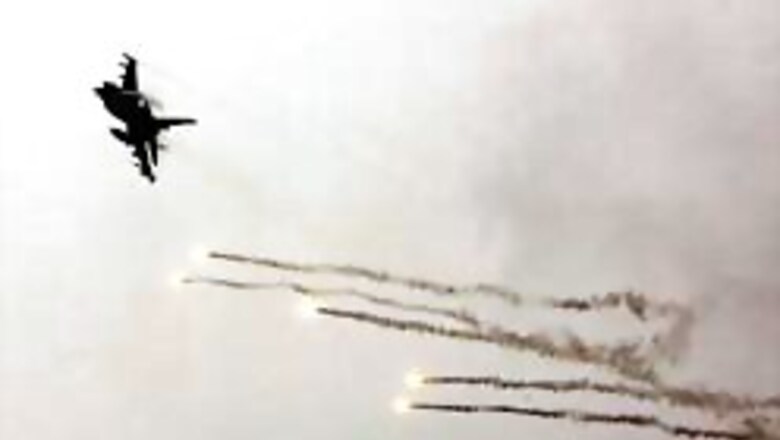
views
Islamabad: The new batch of F-16 multi-role aircraft that the US proposes to sell Pakistan will be used against India, not Al Qaeda, many US lawmakers have said while accusing the Bush administration of "rushing through" the deal.
"This material is not being used against Al Qaeda. It isn't. The potential is that it would be used in a war against India," Democratic Representative Frank Pallone, a strong supporter of India, said of the jets.
The News, Pakistan's major English language newspaper, in a report from Washington quoted Pallone as saying: "We don't need to reward Pakistan for being our friend in the war on terrorism by giving them advanced weapons systems that are not likely to be used in that effort."
Critics of the deal also said the jets were a reward to a country that provides moral support to terror groups fighting India. The Bush administration argues that Pakistan, as a valuable, front-line ally in the search for terrorists, deserves military support from the United States.
They have said that the Bush administration has "glossed over" the non-proliferation aspect of the deal, since Pakistan's record on nuclear proliferation is well known and needs watching.
However, they are caught in a procedural bind and cannot prevent the deal. Lawmakers opposed to the sale said stopping it would be difficult. It would require the passage of a resolution in both the House and Senate before the 30-day review period runs out next week.
Bush could veto any resolution and the sale would clear, unless both chambers of Congress voted by large margins to override the veto.
Dawn said from Washington that "The Indian lobby on Capitol Hill" had launched a campaign to prevent the US from selling F-16 fighter jets to Pakistan.
"The $5.1 billion cutting edge arms package the administration is lining up will not only be useless in the war on terrorism or to hunt Osama bin Laden, but it will also come back to haunt both India and the US," said a statement issued by the US-India Political Action Committee, the Indian caucus on the hill.
PAGE_BREAK
Opponents acknowledged, however, that little can be done to stop the $5.1 billion sale. The shortened period, said House International Relations Committee chairman Henry Hyde, "represents a deliberate and wholly inappropriate manoeuvre by the State Department to diminish the Congress' lawful oversight of arms sales."
John Hillen, assistant secretary of state for political-military Affairs, defended the administration's consultation with Congress as "unprecedented".
He told lawmakers during Thursday's hearing on the jets that "never before have such extensive arms sales consultations taken place".
But the committee's top Democrat, Representative Tom Lantos, said the State Department had "cut this committee, and this Congress, out of consideration of US arms sales. This insolence flies in the face of both custom and the intent of the Constitution."
Lantos said he supported the sale, but the administration's "rush to reduce congressional oversight" meant that lawmakers' legitimate worries over proliferation had been glossed over.
Many US lawmakers fret that the sale could compromise sensitive US technology by exposing it to China. This was sought to be refuted by Pakistan Air Force (PAF) chief, Air Chief Marshal Tanveer Mahmood, who said in Islamabad that there would be no leakage of technology or information to anyone. Pakistan would abide by the terms of the agreement with the US supplier.
However, without referring to the fight against Al Qaeda, and referring to the force balance vis a vis the Indian Air Force, he said that with the induction of the new F-16s, PAF would retain the tactical advantage, despite the smaller number of combat aircraft.
The White House told lawmakers last month that it had approved the sale of the 18 new fighter jets to Pakistan.
The sale, which Pakistan has long sought, would also include an option to order an additional 18 Lockheed Martin jets and to get 26 used aircraft in its arsenal refurbished.




















Comments
0 comment